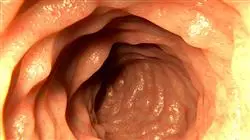University certificate
The world's largest faculty of medicine”
Introduction to the Program
Improve your knowledge in Microbiota and Intestinal Dysbiosis through this program, where you will find the best teaching material with real clinical cases. Learn here about the latest advances in the specialty to be able to perform a quality medical practice"

Of all these, the most complicated, diverse and extensive is that associated with the digestive system: Intestinal microbiota. These communities have a symbiotic and mutualistic behavior with human eukaryotic cells, are essential for the proper functioning of our body, maintain an important dialogue with the immune system and have homeostatic functions that condition our health.
Numerous pieces of scientific evidence have implicated the intestinal microbiome and its metabolic potential in various pathological conditions in recent years, giving rise to new therapeutic strategies to control and regulate this ecosystem. The study of this ecosystem is a field that is rapidly advancing scientifically, and it is universally accepted that to achieve an adequate state of health it is also necessary to have a "healthy" Microbiota.
Our Microbiota undergoes changes as a consequence of the influence of multiple factors, diet, lifestyle, pharmacological treatments..., generating alterations in this bacterial ecosystem; this abnormal interaction that the organism could have with it is related to certain processes: allergic, acute and chronic intestinal diseases, obesity and metabolic syndrome, neurological diseases, dermatitis and other alterations in the dermis and even some types of cancer.
This Postgraduate certificate in Microbiota and Intestinal Dysbiosis provides ease of access to information and the interest aroused among the general population on topics related to the microbiota, its eubiosis and dysbiosis, problems related to them, probiotics and prebiotics and the growing market launching new products with very specific strains for very specific problems and diseases, etc. This makes it necessary for health professionals to be up to date on all scientific advances in this regard to offer the consumer and/or patients more accurate information on the subject, guiding them to recover and maintain that bacterial eubiosis to maintain a good state of health, in addition to collaborating in a positive way with the recommended medical treatment.
Update your knowledge through the Postgraduate certificate in Microbiota and Intestinal Dysbiosis"
This Postgraduate certificate in Microbiota and Intestinal Dysbiosis contains the most complete and up-to-date scientific program on the market. The most important features of the course are:
- Development of case studies presented by experts inMicrobiota and Intestinal Dysbiosis
- The graphic, schematic, and eminently practical contents with which they are created provide scientific and practical information on the disciplines that are essential for professional practice
- Latest information onMicrobiota and Intestinal Dysbiosis
- It contains practical exercises where the self-evaluation process can be carried out to improve learning
- Special emphasis on innovative methodologies in Microbiota and Intestinal Dysbiosis
- All of this will be complemented by theoretical lessons, questions to the expert, debate forums on controversial topics, and individual reflection assignments
- Content that is accessible from any fixed or portable device with an Internet connection
This Postgraduate certificate may be the best investment you can make when choosing a refresher program for two reasons: in addition to updating your knowledge in Microbiota and Intestinal Dysbiosis, you will obtain a Postgraduate certificate certificate from TECH Global University"
The teaching staff includes teaching professionals, who bring their experience to this training program, as well as renowned specialists belonging to leading societies and prestigious universities.
The multimedia content developed with the latest educational technology will provide the professional with situated and contextual learning, i.e., a simulated environment that will provide immersive training program to train in real situations.
The design of this program is based on problem-based learning, by means of which the educator must try to solve the different professional practice situations that arise throughout the Postgraduate certificate. For this purpose, the student will be assisted by an innovative interactive video system created by renowned and experienced experts in the field of Microbiota and Intestinal Dysbiosis with extensive teaching experience.
Increase your decision-making confidence by updating your knowledge through this program"

Make the most of the opportunity to learn about the latest advances in Microbiota and Intestinal Dysbiosis and improve your patient care"
Why study at TECH?
TECH is the world’s largest online university. With an impressive catalog of more than 14,000 university programs available in 11 languages, it is positioned as a leader in employability, with a 99% job placement rate. In addition, it relies on an enormous faculty of more than 6,000 professors of the highest international renown.

Study at the world's largest online university and guarantee your professional success. The future starts at TECH”
The world’s best online university according to FORBES
The prestigious Forbes magazine, specialized in business and finance, has highlighted TECH as “the world's best online university” This is what they have recently stated in an article in their digital edition in which they echo the success story of this institution, “thanks to the academic offer it provides, the selection of its teaching staff, and an innovative learning method aimed at educating the professionals of the future”
A revolutionary study method, a cutting-edge faculty and a practical focus: the key to TECH's success.
The most complete study plans on the university scene
TECH offers the most complete study plans on the university scene, with syllabuses that cover fundamental concepts and, at the same time, the main scientific advances in their specific scientific areas. In addition, these programs are continuously being updated to guarantee students the academic vanguard and the most in-demand professional skills. In this way, the university's qualifications provide its graduates with a significant advantage to propel their careers to success.
TECH offers the most comprehensive and intensive study plans on the current university scene.
A world-class teaching staff
TECH's teaching staff is made up of more than 6,000 professors with the highest international recognition. Professors, researchers and top executives of multinational companies, including Isaiah Covington, performance coach of the Boston Celtics; Magda Romanska, principal investigator at Harvard MetaLAB; Ignacio Wistumba, chairman of the department of translational molecular pathology at MD Anderson Cancer Center; and D.W. Pine, creative director of TIME magazine, among others.
Internationally renowned experts, specialized in different branches of Health, Technology, Communication and Business, form part of the TECH faculty.
A unique learning method
TECH is the first university to use Relearning in all its programs. It is the best online learning methodology, accredited with international teaching quality certifications, provided by prestigious educational agencies. In addition, this disruptive educational model is complemented with the “Case Method”, thereby setting up a unique online teaching strategy. Innovative teaching resources are also implemented, including detailed videos, infographics and interactive summaries.
TECH combines Relearning and the Case Method in all its university programs to guarantee excellent theoretical and practical learning, studying whenever and wherever you want.
The world's largest online university
TECH is the world’s largest online university. We are the largest educational institution, with the best and widest online educational catalog, one hundred percent online and covering the vast majority of areas of knowledge. We offer a large selection of our own degrees and accredited online undergraduate and postgraduate degrees. In total, more than 14,000 university degrees, in eleven different languages, make us the largest educational largest in the world.
TECH has the world's most extensive catalog of academic and official programs, available in more than 11 languages.
Google Premier Partner
The American technology giant has awarded TECH the Google Google Premier Partner badge. This award, which is only available to 3% of the world's companies, highlights the efficient, flexible and tailored experience that this university provides to students. The recognition as a Google Premier Partner not only accredits the maximum rigor, performance and investment in TECH's digital infrastructures, but also places this university as one of the world's leading technology companies.
Google has positioned TECH in the top 3% of the world's most important technology companies by awarding it its Google Premier Partner badge.
The official online university of the NBA
TECH is the official online university of the NBA. Thanks to our agreement with the biggest league in basketball, we offer our students exclusive university programs, as well as a wide variety of educational resources focused on the business of the league and other areas of the sports industry. Each program is made up of a uniquely designed syllabus and features exceptional guest hosts: professionals with a distinguished sports background who will offer their expertise on the most relevant topics.
TECH has been selected by the NBA, the world's top basketball league, as its official online university.
The top-rated university by its students
Students have positioned TECH as the world's top-rated university on the main review websites, with a highest rating of 4.9 out of 5, obtained from more than 1,000 reviews. These results consolidate TECH as the benchmark university institution at an international level, reflecting the excellence and positive impact of its educational model.” reflecting the excellence and positive impact of its educational model.”
TECH is the world’s top-rated university by its students.
Leaders in employability
TECH has managed to become the leading university in employability. 99% of its students obtain jobs in the academic field they have studied, within one year of completing any of the university's programs. A similar number achieve immediate career enhancement. All this thanks to a study methodology that bases its effectiveness on the acquisition of practical skills, which are absolutely necessary for professional development.
99% of TECH graduates find a job within a year of completing their studies.
Postgraduate Certificate in Microbiota and Intestinal Dysbiosis
If you are interested in learning more about the Microbiota and Intestinal Dysbiosis, the Postgraduate Certificate in Microbiota and Intestinal Dysbiosis is ideal for you. During the Postgraduate Certificate, you will be able to update and clarify general and key terms for a full understanding of the subject such as Microbiome, Metagenomics, Microbiota, Symbiosis, Dysbiosis, among others. In addition, you will be able to study the microbial communities that coexist in symbiosis with humans, learning more about their structure, functions and how these communities can be altered due to factors such as diet, lifestyle, among others. Likewise, you will deepen your knowledge of the intestinal microbiota as the main axis of the human microbiota, its interrelation with the rest of the body, its study methods and its applications in clinical practice to maintain a good state of health. One of the important topics addressed in the Postgraduate Certificate is the relationship between intestinal pathologies, such as SIBO, Irritable Bowel Syndrome (IBS), Crohn's disease, and intestinal dysbiosis. You will also learn how to manage strategies, in an updated way, to treat the different intestinal infections by viruses, bacteria, parasites and fungi, modulating the altered intestinal microbiota.
You will be updated on the latest advances in intestinal microbiota and dysbiosis.
In this exclusive TECH program, you will delve into the bidirectional relationship between the Microbiota and the Neuroimmune System, studying in depth the gut-microbiota-brain axis and all the pathologies that are generated in its imbalance. In addition, you will delve into the entire oral and respiratory structure, and the ecosystems that live in them, seeing how an alteration of these ecosystems has a direct relationship with many associated pathologies. The best thing is that thanks to the study methodology implemented by TECH, you will be able to combine your current routine with this new academic challenge and achieve the goal in a few hours of study and 100% online.







